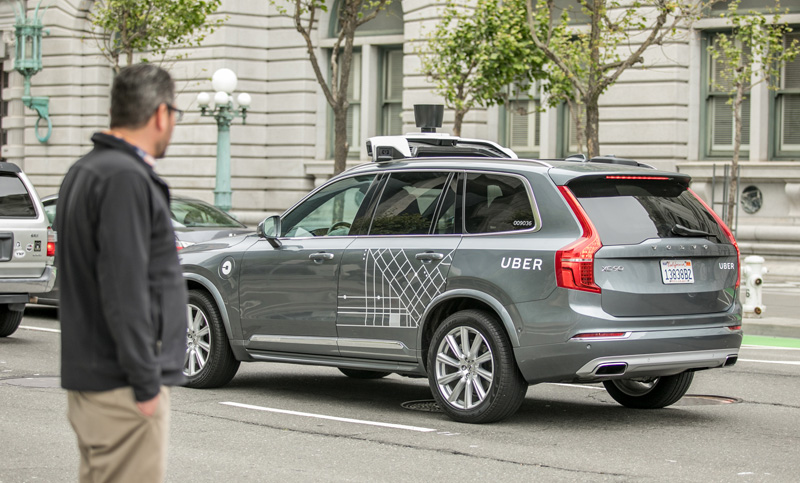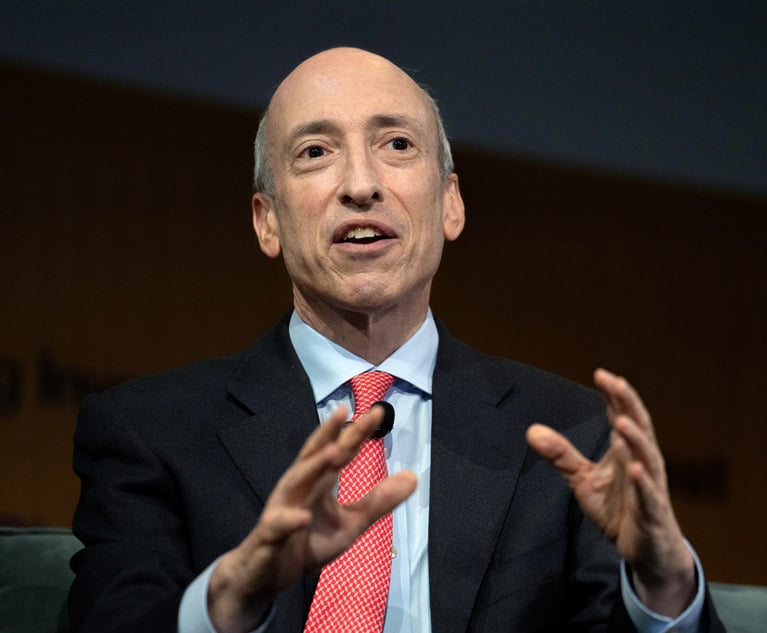First Fatal Accident Involving Autonomous Uber Car Raises Novel Legal Issues
According to police officials in Tempe, Arizona, an autonomous Uber car with a safety driver behind the wheel last night struck and killed a woman crossing the street outside a crosswalk.
March 19, 2018 at 02:17 PM
6 minute read
The original version of this story was published on The Recorder

Just who can be held liable when an autonomous vehicle strikes and kills a pedestrian?
That legal question became more urgent Monday as news emerged that an autonomous Uber car struck and killed a pedestrian in Tempe, Arizona.
Police in the Phoenix suburb on Monday said the vehicle was in autonomous mode with a driver behind the wheel around 10 p.m. local time when it struck a woman who was crossing the road outside a crosswalk. She was transported to a local hospital where she died from injuries suffered in the accident.
Uber Technologies Inc. issued a statement saying “our hearts go out to the victim's family. We're fully cooperating with Tempe police and local authorities as they investigate this accident.”
Uber announced that it is suspending autonomous vehicle testing in Tempe, San Francisco and other cities.
The National Transportation Safety Board is sending an investigation team to the accident site in Tempe, a spokesman said Monday.
“What this shows unfortunately is that these cars are going to kill people, and we need to understand that and think about the implications of that and the algorithms that are controlling the decision-making of these cars,” said John Simpson, the technology project director of Consumer Watchdog. The Santa Monica-based group called for a national moratorium on driverless car testing in the wake of Sunday night's accident.
In recent years, Arizona has tried to position itself as a friendlier testing environment for autonomous technology than its western neighbor. After California regulators ordered Uber in 2016 to shut down the company's unpermitted testing of autonomous vehicles on San Francisco streets, Arizona Gov. Doug Ducey issued a statement urging the company to move its operations to his state.
“While California puts the brakes on innovation and change with more bureaucracy and more regulation, Arizona is paving the way for new technology and new businesses,” Ducey wrote, touting his state's minimal regulations. “California may not want you, but we do.”
Uber briefly suspended its national testing program in March 2017 after one of its Volvo SUVs was hit by a driver turning in front of it at a Tempe intersection, according to the Tempe Police Department.
Ducey earlier this month signed an executive order allowing autonomous vehicles to operate on the state's roads without a human present.
“As technology advances, our policies and priorities must adapt to remain competitive in today's economy,” said Ducey in a news release announcing the change. “This executive order embraces new technologies by creating an environment that supports autonomous vehicle innovation and maintains a focus on public safety.”
The California Department of Motor Vehicles on Monday said in a statement that it was aware of the crash in Arizona, but that it had not yet been briefed on the details. “ We plan to follow up with Uber to get more information,” the agency said.
The accident involving the autonomous Uber car is among the first fatalities linked to the driverless car industry. In May 2016, a man riding in a Tesla operating in autopilot mode was killed when his vehicle steered under an 18-wheel truck and trailer.
The Road Ahead
Todd Benoff at Alston & Bird in Los Angeles, whose practice has focused recently on liability and cybersecurity issues in autonomous vehicles, said part of the reason the incident is making news is because it's an outlier. “So far at least, in testing, these vehicles have shown themselves to be safe,” he said.
Benoff said a lot will depend on what the company and regulators find in their investigation. The incident could be tied to an error in the car, the actions of the pedestrian or some combination of the two. But Benoff said that if the woman's family determines that Uber or Volvo—the car's maker—are at fault, they could likely pursue claims under a strict liability standard, rather than the negligence standard that would apply to a human driver.
“The argument I would expect to see is that this is a vehicle and we've always judged vehicles by a strict liability standard,” Benoff said. “It gets interesting to me now that the driver and car are merging.”
Larry Coben, a Phoenix-based attorney for Anapol Weiss, agreed that multiple parties could face liability issues.
“There can be shared responsibility,” Coben said. “It's certainly possible that it's product liability, but it's hard to know without knowing all the facts and knowing how it was designed.”
Elise Sanguinetti, a partner at Arias Sanguinetti Wang & Torrijos in Oakland, also predicted the case could have multiple defendants.
“We don't know if in this case if Uber is going to say, 'We're going to take responsibility,' or if they're going to say, 'This software developer who worked with us is responsible,'” Sanguinetti said.
Sanguinetti said there will be “a ton of data” from the incident to be analyzed and that she hopes it's all made public.
Though the victim was not an Uber passenger, Sanguinetti said her family may be bound by Uber's arbitration agreement if she ever downloaded the company's app.
“It's such a broad-faced arbitration requirement they have inside this app,” she said.
Ryan Calo, University of Washington School of Law associate professor who teaches robotics law and policy wrote on Twitter that Uber likely won't let any lawsuit go to court. “Uber will settle this driverless crash,” Calo said. “And fast. It's not ready for a test case.”
California could start allowing autonomous cars to test on its roads without drivers as soon as April 2 under rules recently approved by the Office of Administrative Law. Testing companies will be required to meet a list of requirements, including notifying cities and counties of their plans and providing the DMV with proof that their cars meet federal safety standards or have an exemption from those standards from federal regulators.
The chairman of the California Assembly Transportation Committee said he will hold hearings in May to review safety issues surrounding autonomous vehicles.
Max Mitchell of the Legal Intelligencer contributed to this report.
Read more:
What Happens if a Self-Driving Uber Is in a Crash?
Biggest Issue for Autonomous Car Lawyers? Managing Liability, Akin Partner Says
Trump's Autonomous Car Guidance Puts Automakers in Driver's Seat
Why Uber's Hired a Federal Health Care Lobbyist
This content has been archived. It is available through our partners, LexisNexis® and Bloomberg Law.
To view this content, please continue to their sites.
Not a Lexis Subscriber?
Subscribe Now
Not a Bloomberg Law Subscriber?
Subscribe Now
NOT FOR REPRINT
© 2025 ALM Global, LLC, All Rights Reserved. Request academic re-use from www.copyright.com. All other uses, submit a request to [email protected]. For more information visit Asset & Logo Licensing.
You Might Like
View All
Am Law 100 Partners on Trump’s Short List to Replace Gensler as SEC Chair
4 minute read


Trending Stories
- 1ACC CLO Survey Waves Warning Flags for Boards
- 2States Accuse Trump of Thwarting Court's Funding Restoration Order
- 3Microsoft Becomes Latest Tech Company to Face Claims of Stealing Marketing Commissions From Influencers
- 4Coral Gables Attorney Busted for Stalking Lawyer
- 5Trump's DOJ Delays Releasing Jan. 6 FBI Agents List Under Consent Order
Who Got The Work
J. Brugh Lower of Gibbons has entered an appearance for industrial equipment supplier Devco Corporation in a pending trademark infringement lawsuit. The suit, accusing the defendant of selling knock-off Graco products, was filed Dec. 18 in New Jersey District Court by Rivkin Radler on behalf of Graco Inc. and Graco Minnesota. The case, assigned to U.S. District Judge Zahid N. Quraishi, is 3:24-cv-11294, Graco Inc. et al v. Devco Corporation.
Who Got The Work
Rebecca Maller-Stein and Kent A. Yalowitz of Arnold & Porter Kaye Scholer have entered their appearances for Hanaco Venture Capital and its executives, Lior Prosor and David Frankel, in a pending securities lawsuit. The action, filed on Dec. 24 in New York Southern District Court by Zell, Aron & Co. on behalf of Goldeneye Advisors, accuses the defendants of negligently and fraudulently managing the plaintiff's $1 million investment. The case, assigned to U.S. District Judge Vernon S. Broderick, is 1:24-cv-09918, Goldeneye Advisors, LLC v. Hanaco Venture Capital, Ltd. et al.
Who Got The Work
Attorneys from A&O Shearman has stepped in as defense counsel for Toronto-Dominion Bank and other defendants in a pending securities class action. The suit, filed Dec. 11 in New York Southern District Court by Bleichmar Fonti & Auld, accuses the defendants of concealing the bank's 'pervasive' deficiencies in regards to its compliance with the Bank Secrecy Act and the quality of its anti-money laundering controls. The case, assigned to U.S. District Judge Arun Subramanian, is 1:24-cv-09445, Gonzalez v. The Toronto-Dominion Bank et al.
Who Got The Work
Crown Castle International, a Pennsylvania company providing shared communications infrastructure, has turned to Luke D. Wolf of Gordon Rees Scully Mansukhani to fend off a pending breach-of-contract lawsuit. The court action, filed Nov. 25 in Michigan Eastern District Court by Hooper Hathaway PC on behalf of The Town Residences LLC, accuses Crown Castle of failing to transfer approximately $30,000 in utility payments from T-Mobile in breach of a roof-top lease and assignment agreement. The case, assigned to U.S. District Judge Susan K. Declercq, is 2:24-cv-13131, The Town Residences LLC v. T-Mobile US, Inc. et al.
Who Got The Work
Wilfred P. Coronato and Daniel M. Schwartz of McCarter & English have stepped in as defense counsel to Electrolux Home Products Inc. in a pending product liability lawsuit. The court action, filed Nov. 26 in New York Eastern District Court by Poulos Lopiccolo PC and Nagel Rice LLP on behalf of David Stern, alleges that the defendant's refrigerators’ drawers and shelving repeatedly break and fall apart within months after purchase. The case, assigned to U.S. District Judge Joan M. Azrack, is 2:24-cv-08204, Stern v. Electrolux Home Products, Inc.
Featured Firms
Law Offices of Gary Martin Hays & Associates, P.C.
(470) 294-1674
Law Offices of Mark E. Salomone
(857) 444-6468
Smith & Hassler
(713) 739-1250






